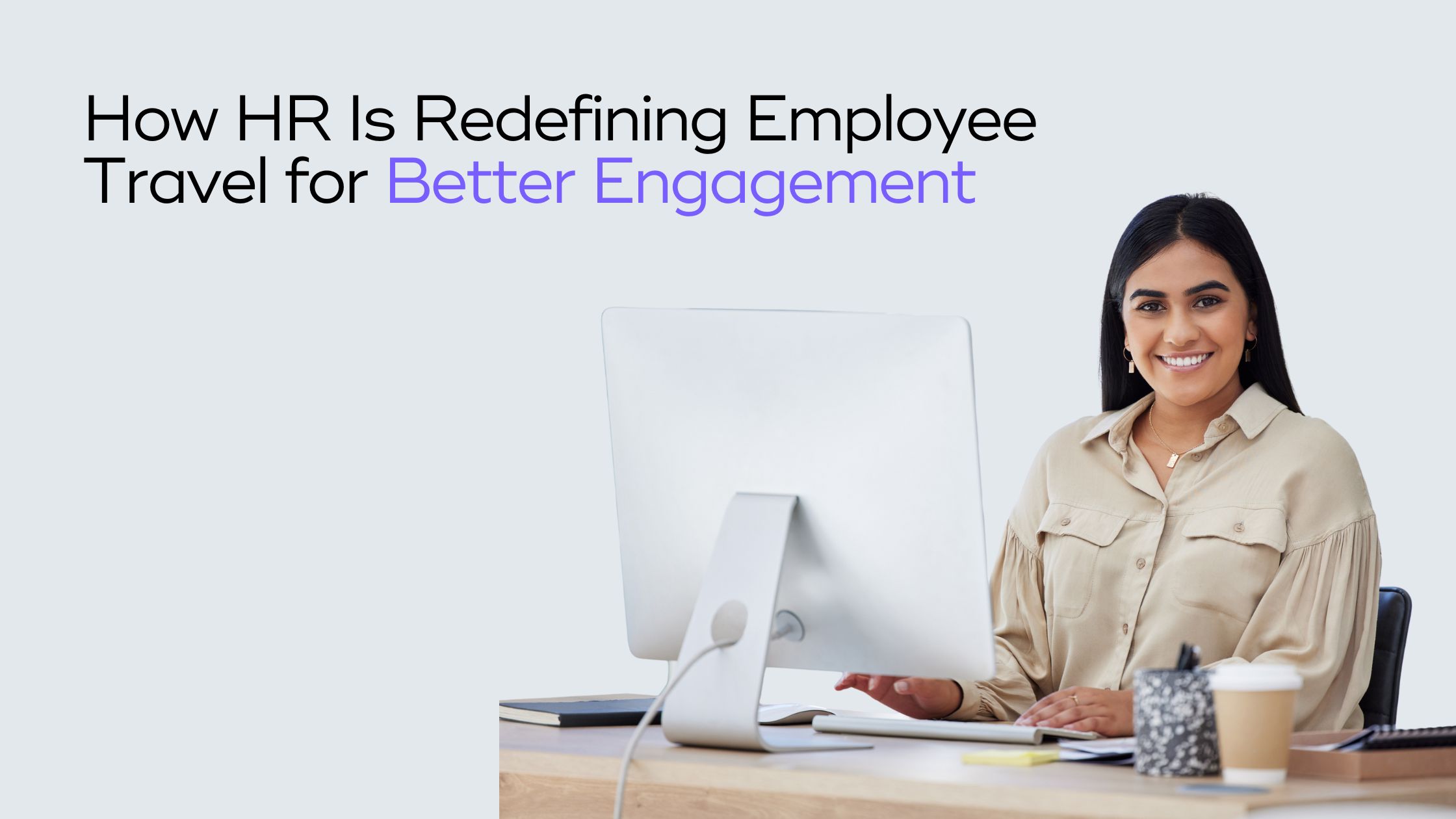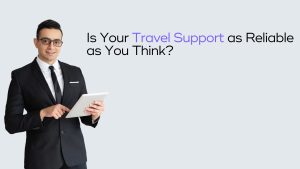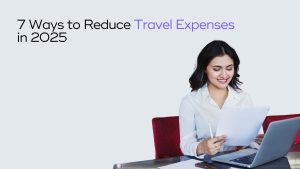Because employee travel isn’t just about getting from A to B it’s how your employees feel in the process.
Have You Ever Felt This as an HR?
You’re trying to close the monthly engagement report…
At the same time, an employee calls to check if their cab is confirmed for tomorrow.
Someone else is asking about the travel policy for international trips.
And another team lead is upset because their hotel wasn’t booked near the client’s office — again.
Sounds familiar?
That’s exactly what many modern HR professionals are facing today because business travel has become more than just logistics.
It’s now a key part of how employees experience the company. And you as HR are expected to manage all of it smoothly.
In this blog, you’ll explore why modern HR teams are redesigning corporate travel to enhance employee experience, what challenges they face, and how smart solutions (like CoTrav) are helping HR take control with ease.
Why Travel Now Falls Under HR’s Experience Umbrella
Let’s be honest — you’re not a travel agent.
But every time something goes wrong in travel, employees don’t call the admin team.
They call you.
Why?
Because travel isn’t just a ticket. It’s tied to:
- Employee well-being
- Productivity during travel
- Comfort and safety
- And most importantly how valued they feel
Today, your employees expect ease, clarity, and care even when they’re travelling for work. That makes travel an HR responsibility, because it directly impacts employee satisfaction.
1. Travel is No Longer Just About Logistics — It’s Part of EX
Earlier, corporate travel was all about logistics: booking the cheapest flights, ticking boxes, and collecting bills. But today, travel is an emotional and professional touchpoint in an employee’s journey.
Imagine an employee landing late at night with no airport pickup arranged, or being sent to a low-rated hotel just to save costs. You know how that story ends with frustration, complaints, and low morale.
Today’s workforce values comfort, flexibility, and reliability. Business travel is often their first time representing the company outside the office. So, if that experience is chaotic, it affects their performance and your brand image.
As HR, you’re expected to balance cost-efficiency with care. That’s why travel must be seen not as a transaction, but as an experience that shapes trust, engagement, and loyalty.
2. HR Faces the Pressure of Managing Travel with No Travel Expertise
You probably weren’t trained in travel management. But somehow, it’s become part of your role.
You’re handling everything from last-minute approvals to reconciling travel bills all while ensuring compliance, safety, and employee satisfaction. And when something goes wrong (flight delays, hotel mix-ups, no GST invoice), the calls come straight to you.
The pressure increases when:
- You’re managing bulk travel for events or training
- Employees ask for personalized options or upgrades
- Finance wants detailed spend reports and policy alignment
You’re not just solving travel needs; you’re managing expectations, budgets, timelines, and sometimes, even emergencies all without a dedicated tool or team.
Redesigning the travel experience means giving HR better control, visibility, and support to make decisions confidently.
3. Employees Expect Consumer-Like Travel Experience — Even for Work
Today’s employees book personal vacations with apps like MakeMyTrip or Airbnb — fast, smooth, and full of options.
But when it comes to corporate travel?
They’re stuck in email threads, Excel approvals, and unclear policies.
The shift is clear: Employees expect the same ease at work that they get in personal travel. That includes:
- Transparent choices (flights, trains, hotels)
- Real-time support
- Mobile access to itineraries
- Seamless reimbursements
When your company travel system feels outdated, employees either avoid it or go off-policy, which creates more work for you.
A redesigned travel program is one that meets them where they are mobile-first, flexible, fast, and fair.
4. Safety and Support Are Now Top Priorities
You’re responsible for ensuring that employees are traveling safely. But how do you update about everyone’s location during trips? How do you respond quickly if someone misses a connection or faces a delay?
Employees want to know:
- Who do I call if I need help?
- Is my hotel verified and safe?
- Will I get assistance if my flight gets canceled?
If you don’t have answers or real-time visibility, employee trust is at risk.
Redesigning travel for EX means giving HR and employees access to live update, emergency support, verified vendors, and an always-on travel buddy without depending on WhatsApp or spreadsheets.
5. The Rise of Bleisure & Personalization in Work Travel
Another big shift: employees now mix business with leisure called bleisure.
If someone’s flying to Mumbai for a two-day conference, they may want to extend the trip and explore nearby. Modern companies are encouraging this. It’s a great way to reward employees and avoid burnout.
But you still face the tricky part.
How do we manage bookings that are partially personal, partially official?
What if the employee wants to upgrade rooms and pay the difference?
The old travel systems don’t support this. HR ends up chasing approvals and explaining policy exceptions.
That’s why redesigning travel includes flexibility in plans, partial billing, and custom travel rules so you can say “yes” more easily while staying compliant.
Why This Impacts Employee Experience
Employees notice everything:
- Was the process smooth or frustrating?
- Did the company think about their comfort, or just save cost?
- Did someone check on their safety?
- Was the reimbursement fast, or did it take a month?
If the experience is poor, it doesn’t just annoy employees — it makes them feel the company doesn’t value them.
And that feeling? It stays with them long after the trip ends.
When you don’t manage to travel well, you lose trust.
When you do, you earn respect.
That’s why more and more modern HR teams are redesigning travel as part of their EX strategy not leaving it to chance or chaos.
So, What Does a Redesigned Travel Experience Look Like?
Here’s what a modern, employee-centric travel experience means for you:
- One platform for bookings, approvals, invoicing, and reporting
- Real-time updates and support — no more missed follow-ups
- Custom travel policies for different departments or grades
- GST-compliant invoices and cost tracking for finance
- A mobile app for employees to self-manage with transparency
- Safety alerts and tracking for duty of care
- Smooth bleisure integration with split bills
It’s not just more efficient, it shows your company cares about its people on the move.
How You Can Start Redesigning Travel — Without Getting Overwhelmed
This doesn’t mean you take on more work. It means you set up smarter systems so travel runs better — with less manual effort from you.
Here’s where you can start:
- Talk to employees who travel often – What frustrates them? What’s missing?
- Review the current process – Where are the delays happening?
- Update travel policy – Make it short, clear, and visible.
- Digitize approvals and bookings – Avoid manual emails and WhatsApp follow-ups.
- Choose one platform to manage everything – So you’re not juggling Excel, PDFs, and calls every day.
And This Is Exactly Where CoTrav Helps You
If you’ve been handling corporate travel the hard way CoTrav makes it easy.
With CoTrav, you get:
- A single dashboard to manage all bookings, approvals, and expenses
- Verified hotels, flights, cabs already filtered as per your policy
- Real-time employee tracking and 24×7 travel support
- Smart reports and insights for HR and finance
You don’t have to chase anyone.
You don’t have to explain the same policy ten times.
You don’t have to stay up coordinating last-minute changes.
CoTrav takes care of the complexity, so you can focus on your people.
Conclusion
As an HR professional, you’re expected to create a workplace where people feel valued, supported, and empowered even when they’re 30,000 feet in the air or checking into a hotel at midnight.
Redesigning travel isn’t about adding more to your plate. It’s about shifting from reactive to proactive from chaos to control.
When travel runs smoothly, employees notice. They feel cared for. And that directly strengthens how they view their role, their team, and your company.
As a result, modern HR teams are no longer just booking trips — they’re crafting travel experiences that enhance engagement, trust, and loyalty.
And with the right platform, you can too.
Want to finally make employee travel stress-free and experience-led?
Let CoTrav help you take the chaos out of travel management.
FAQs
1. Why is HR getting involved in employee travel now?
Because travel impacts employee experience. HR ensures every trip reflects care, comfort, and company culture — not just coordination.
2. What challenges do HR teams face in employee travel?
Last-minute changes, delays, scattered bookings, and safety concerns make travel hard to manage without the right system.
3. How does travel affect employee engagement?
A smooth travel experience boosts morale, while stressful trips can lower satisfaction and increase burnout.
4. Can travel be personalized without losing control?
es! With tools like CoTrav, you can personalize travel and still maintain policy, cost, and compliance.
5. Is it possible to simplify travel without adding work?
Definitely. Platforms like CoTrav automate the process so HR spends less time on requests and more on strategy.




